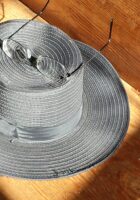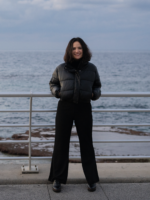Poem of the Week | February 26, 2024

“On Renting” by Sara Fetherolf
“On Renting” by Sara Fetherolf is our Poem of the Week.
Sara O. Fetherolf (she/they) is the author of Via Combusta, selected by Quan Barry for the New American Poetry Prize and published by New American Press in 2022. They won the 2021 Iron Horse Long Story award and they have written text for song cycles and short operas that have been performed around the country. Her writing appears in publications like Best Microfiction 2023, Gulf Coast, CALYX, Storm Cellar, and Gigantic Sequins. They have an MFA from Hunter College and a PhD from University of Southern California. Find her work at sarafetherolf.com.
On Renting
This 10AM, the landlord
walks by my bedroom window,
showing the city utility worker
to the gas meter.
I would prefer that he not
know I’m asleep this late, his footsteps
and shadow filtering through
the blinds. I would prefer he not know
the extravagant heating bill we’ve racked up
this rainy January.
I’d prefer he not see the tall weeds
growing around the meter and take it
upon himself to chop
them to the quick. I’d prefer
to not feel Protestantly guilty
for how in my privacy I am
weedy & extravagant, a late sleeper.
Once, I was taught the Lord
owns my life, spreads the sky
like a ceiling over my head, grants money
to those he favors, lightning otherwise.
I suppose the landlord is
a small, frumpy incarnation of that
Lord, taking it upon himself
to trudge past my window
and inspect the meter, talk
to the lime-vested employee
who is calculating our bill
and not his. In the last days
of my faith, I came to think of the Lord
as an enormous grub,
pillowy & pale as curdled milk.
He eats rot into this earth
like a maggot into a potato
but it is human meat
He craves. He wants to make us
in His image by consuming
us down to the bone.
Then I decided I was being unfair
to the grubs, who are, after
all, only naïve
and hungry. I do not believe
the landlord is acting on instinct
when he wriggles through my
morning, but rather some assumed
righteousness. Please don’t catch me,
I think, a blanket at my throat.
Let me send the old gods
after him: Hermes, the thief,
who adores the delicate skins
of true maggots and their instinct
for taking what they need.
Let me send a banshee
to howl at his mailbox
each time he opens a rent check.
Let me send the gods that are grubs
to consume him. It is not even,
honestly, that he is an unkind man.
I should be Protestantly grateful
he loaned us buckets
when the rain came through
and faithfully called the cheapest
workmen to come fix the roof.
In the letter about raising our rent,
he left a polite paragraph
insisting he ought to raise it more, only
he knows times are hard.
Praise be, I guess.
But I am not one who trusts
righteousness, and the old
gods whisper to me:
Let the weeds grow high.
Let blood and rain and bone meal
feed them. Let the maggots eat
the bills. Once upon a time,
they tell me, it will be
your footsteps you hear
outside your bedroom window.
In that country there will be
no gas meter, only
cooking fires & newborn wolves & stars
maggoty overhead.
The wilderness that is to come
is not yours, but it sure as hell
is no one else’s either.
It is biding its time.
It wants blood, not money.
There is no one, they say,
on earth who can escape
its appetite.
Author’s Note
Last year, I made a pledge to draft a new poem every day. Most of these drafts were not very good. But even in the bad drafts, I found myself circling the same images and incidents day after day, as if my subconscious were looking for something I couldn’t name yet. About once every two weeks, I would come up with a draft that finally resolved for me an idea I’d been chasing after. “On Renting” began as such a draft, after two weeks of writing rant-y poems about my busybody landlord and my contradictory desires to have a home that I own and to abolish all forms of private land ownership. Hermes, the thief god, kept showing up in my poems around this time, and I think the turn toward the old gods helped me to find a deeper resolution than I had in previous drafts.
In general, it was a useful revelation to know that I could write bad poems day after day and trust that I was working toward something I couldn’t see yet. It has reshaped how I approach my writing life, and I am glad the first of these poems is entering the world here.
SEE THE ISSUE
SUGGESTED CONTENT

Poem of the Week
May 06 2024
“from Elam House (Austin, Minnesota)” by G.C. Waldrep
“from Elam House (Austin, Minnesota)” by G.C. Waldrep is our Poem of the Week. G.C. Waldrep’s most recent books are feast gently (Tupelo, 2018), winner of the William Carlos Williams… read more

Poem of the Week
Apr 29 2024
“This Body is a Songbird in a Kiln” by Athena Nassar
“This Body is a Songbird in a Kiln” by Athena Nassar is our Poem of the Week. Athena Nassar is an Egyptian-American poet, essayist, and short story writer from Atlanta,… read more

Poem of the Week
Apr 22 2024
“Faith” by Nur Turkmani
“Faith” by Nur Turkmani is our Poem of the Week. Nur Turkmani lives in Beirut and researches social movements, gender, displacement, and agriculture. Her writing appears in West Branch, The… read more

